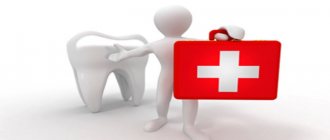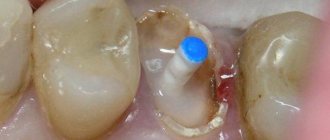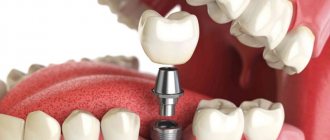What do you need to register with a dental clinic and how to make an appointment?
To register, the patient must go to the selected clinic with a compulsory medical insurance policy, a passport and a written application. At the registry, the data will be entered into the database and the services will become available.
Appointments can be made in advance through a personal call to the PC, through a terminal in the lobby or through an online application. The patient receives a coupon with which he goes to see a doctor.
Without a coupon they are accepted only in acute situations when it comes to emergency care.
The compulsory medical insurance policy is also valid in some private clinics. The list is also on the insurance company’s website, but there are usually not many of them. Since insurance is not able to cover clinic costs for treatment, free services are provided by a few private dentists.
Features of emergency and 24-hour dentistry
Dentistry at night admits patients without an appointment in cases of sharp and sudden pain in the teeth and jaw.
As a rule, a general practitioner is on duty at night; less often, a dental surgeon stays overnight with him or instead of him in specialized centers. The working hours of the doctors on duty are from eight in the evening to eight in the morning. On Stom-Firms.ru, read about situations when urgent intervention is required at night, what problems are addressed to doctors and how much an appointment costs.
How to make an appointment at a private clinic:
Even if a private clinic is included in the insurance company’s list, you should check with the clinic directly about the possibility of treatment under compulsory medical insurance. Do not forget that the patient may still pay for some procedures. It is better to ask these nuances before starting treatment to avoid misunderstandings.
If the clinic really provides compulsory medical insurance services, the patient must go to the clinic at his place of registration and get a referral from a doctor.
When all the details have been resolved, you can make an appointment.
IMPORTANT!
Contact your insurance company with any confusion or questions. This can be done by calling the hotline or during a personal visit.
Paid and free on-duty dental centers in St. Petersburg
On this page you will find the addresses and telephone numbers of municipal and private dentists working 24 hours. There is also information on prices for services that are performed on an emergency basis in various clinics. The cost of the intervention depends on the complexity of each case.
Prices for basic urgent procedures in 24-hour dentistry:
- Removal of one tooth - from 1,500 to 4,500 rubles;
- Treatment of three-channel pulpitis - from 7,500 to 14,000 rubles.
The cost of a doctor’s services in dentists working at night depends on his qualifications. The cost is also influenced by the type of materials and painkillers used, and the volume of surgical intervention. A consultation with a doctor on duty costs from 350 to 100 rubles; in some centers the doctor examines you for free. X-rays are also paid separately.
Consumables and drugs under compulsory medical insurance
Insurance companies only pay local manufacturers. Therefore, imported consumables and medicines are not included in the program.
What you can count on:
Composite material
Some domestic medicines
Material for dressings
Consumables for equipment
Anesthesia drugs
In general, this is not a small list that allows you to qualitatively cure a tooth or an oral disease.
In some cases, the doctor may suggest an alternative imported material, but it will be added to the invoice for payment.
. You can refuse the offer; the decision is up to the patient.
Light seals
Dental cement is one of the very first materials in dentistry. Over the entire period of use, it has proven itself well, despite its short service life. But in modern dentistry, better alternatives have appeared - light fillings.
They are also included in the insurance program and can be installed free of charge, but only if indicated. In free dentistry, such fillings are most often placed on the front teeth.
Free medical care
Compulsory medical insurance is part of the state system of social protection of citizens' interests in health care.
The purpose of compulsory medical insurance is to provide every citizen of the Russian Federation with the occurrence of an insured event (illness, injury, childbirth, etc.) medical and drug care free of charge in the volume and on the terms of the compulsory medical insurance program.
In St. Petersburg, the types and volumes of medical care, as well as the conditions and terms of its provision to citizens under compulsory medical insurance, are determined by the Law of St. Petersburg
“On the Territorial program of state guarantees of free provision of medical care to citizens in St. Petersburg for 2022 and for the planning period of 2022 and 2022” (adopted by the Legislative Assembly of St. Petersburg on December 18, 2019)
In accordance with the Federal Law of November 21, 2011 No. 323-FZ “On the fundamentals of protecting the health of citizens in the Russian Federation,” the Russian Government annually approves a program of state guarantees of free medical care to citizens for a period of three years (for the next financial year and for the planning period) .
You can always find out what kind of medical care you can receive under the Territorial Compulsory Medical Insurance Program and in which medical organizations (MO registry) from your medical insurance organization. Official website of the Territorial Compulsory Medical Insurance Fund of St. Petersburg spboms.ru
LIST OF DENTAL SERVICES INCLUDED IN THE COMPLIANCE PROGRAM
Therapeutic dentistry and periodontology:
- Appointment with a dentist;
- Treatment of caries and non-carious lesions of teeth using chemically cured filling materials of domestic production in cases of tooth decay of less than 50%;
- Treatment of pulpitis (inflammation of the nerve of the tooth) using endodontic instruments and filling materials of domestic production;
- Treatment of periodontitis (inflammation of the tissues surrounding the tooth root) using endodontic instruments and domestically produced filling materials;
- Removal of dental deposits (tartar above and below the gum) by manual mechanical method simultaneously in the area of up to six teeth;
- Treatment of inflammatory diseases of the oral mucosa and gums (gingivitis, periodontitis, stomatitis) using domestically produced medicines with the exception of surgical treatment methods;
- Anesthesia during dental treatment using anesthetics and standard disposable syringes of domestic production;
- Treatment of dental hypersensitivity (hypersensitivity) using domestically produced fluoride-containing preparations;
- Grinding of hard dental tissues;
Surgical dentistry:
- Appointment with a dentist-surgeon;
- Simple and complex tooth extraction, including the removal of dystopic and impacted teeth (with anomalies in location) for medical reasons (except for preparing teeth for prosthetics and for orthodontic reasons);
- Anesthesia during dental treatment using anesthetics and standard disposable syringes of domestic production;
- Treatment of pericoronitis (excision of the hood) with difficult teething;
- Treatment of alveolitis (inflammation of the socket of an extracted tooth) with curettage of the socket;
- Treatment of injuries to the maxillofacial area (splinting teeth in case of fracture, changing rubber traction and removing splints);
- Treatment of inflammatory diseases of the oral cavity: opening of a subperiosteal abscess, soft tissues in the oral cavity;
- Removal of bony protrusions;
- Removal of benign neoplasms in the periodontal area and oral mucosa;
- Treatment of diseases of the salivary glands (diagnosis of the disease, carrying out complex measures aimed at correcting immunity, influencing the pathological process in the salivary gland).
LIST OF DENTAL SERVICES NOT INCLUDED IN THE COMPLIANCE PROGRAM AND STATE GUARANTEES
THERAPY
- Aesthetic restoration of teeth using light-curing materials;
- Light-curing fillings;
- Production of veneers by direct and indirect methods;
- The use of intracanal pins (fiberglass, parapulp, etc.);
- Treatment of root canals of teeth: treatment of root canals using NITI rotating machine instruments, filling of root canals using gutta-percha pins and imported pastes using various filling methods);
- Intra-canal whitening of pulpless (“dead”) teeth;
- Restoration of the tooth stump under an artificial crown from modern polymer and glass ionomer materials of imported origin;
- Depulpation of teeth under X-ray control in order to prepare teeth for dentures;
- Retreatment of teeth for the purpose of dental prosthetics previously treated in other health care facilities;
- Unsealing root canals for inlays for the purpose of dental prosthetics;
- Treatment of inflammatory periodontal diseases using modern methods (VECTOR device, laser, ultrasound therapy) and imported materials - targeted regeneration of soft tissues, splinting of mobile teeth, cosmetic closure of exposed tooth necks, etc.;
- Surgical methods for the treatment of periodontal diseases (open curettage, flap surgery, gingivoplasty, etc.);
- Anesthesia using imported carpule anesthetics;
- Prevention of dental diseases: professional oral hygiene, removal of dental plaque using an ultrasonic device, use of AIR-FLOW, removal of age spots, plaque, coating with imported fluoride-containing preparations, deep fluoridation of teeth, teeth whitening;
- Three-dimensional computed tomography of the maxillofacial region in 3D format;
- Orthopantomography of the maxillofacial area for persons over 18 years of age and of working age;
- X-ray examination in the provision of paid medical services and preparation for dentures.
SURGERY
- Surgical methods for the treatment of periodontal diseases (open curettage, flap surgery, gingivoplasty, etc.);
- Implantology, operations for guided bone regeneration and plastic surgery of soft tissues in the area of implants;
- Anesthesia using imported carpule anesthetics;
- Tooth extraction for orthodontic and orthopedic indications for persons over 18 years of age;
- Cystotomy;
- Cystectomy (removal of the root cyst);
- Plastic surgery of the frenulum of the upper or lower lip, frenulum of the tongue for persons over 18 years of age;
- Plastic surgery of scars and cords of the oral mucosa;
- Plastic surgery for gum recession, including connective tissue graft (local tissue);
- Resection of the root apex;
- Hemisection;
- Vestibuloplasty surgery;
- Correction of lip and tongue frenulum using a diode laser;
- Three-dimensional computed tomography of the maxillofacial region in 3D format;
- Orthopantomography of the maxillofacial area for persons over 18 years of age and of working age;
- X-ray examination in the provision of paid medical services and preparation for dentures.
ORTHOPEDICS
- Providing orthopedic treatment to persons over 18 years of age and of working age;
- Partial and complete removable laminar dentures made from imported material;
- Clasp dentures of varying degrees of complexity;
- Fixed dentures (single and bridge dentures: steel, plastic, metal-plastic, metal-ceramic, prostheses made of gold and precious metals) from imported materials;
- Prosthetics on implants;
- Anesthesia using imported carpule anesthetics;
- Depulpation of teeth under X-ray control in order to prepare teeth for dentures;
- Three-dimensional computed tomography of the maxillofacial region in 3D format, orthopantomography;
- Orthopantomography of the maxillofacial area for persons over 18 years of age and of working age;
- X-ray examination in the provision of paid medical services and preparation for dental prosthetics;
- Retreatment of teeth for the purpose of dental prosthetics previously treated in other health care facilities;
- Unsealing root canals for inlays for the purpose of dental prosthetics.
What to pay attention to
It is important to know that where treatment is provided free of charge under compulsory medical insurance, additional paid services are also provided. In many public dentistry, doctors have a list of not only domestic, but also paid imported materials, and carry out procedures for which they will then have to pay.
So that the news about the need to pay for treatment at a municipal clinic does not come as a shock to you, check with specialists in advance whether the service you need is included in the list of free services approved by the insurance program in the region. If the doctor offers any additional manipulations, then do not hesitate to clarify whether it is paid or free.
It should be taken into account that sometimes situations arise when it is better to pay extra for materials than to carry out treatment completely free of charge. Let's give a few examples.
Wisdom teeth removal
If you need to remove a wisdom tooth, then if you have a compulsory medical insurance document and want to be treated, you will be given a domestic anesthetic for free. However, it is far from certain that it will completely eliminate pain. Of course, in this case, it is better for the patient to pay for imported anesthesia, which has a minimum of side effects, high efficiency and a long exposure time.
Important! In free medicine, doctors often use painkillers such as Novocaine and Lidocaine. These drugs can cause individual intolerance, allergic reactions and side effects (especially in people with cardiovascular diseases, diabetes and hypertension, and elderly patients).
When filling
If you want to have your teeth filled with high quality, it is better to pay extra for the installation of an imported filling made from light-curing composites. Firstly, the material hardens very quickly, which means the patient has fewer restrictions after treatment. Secondly, the restoration looks more beautiful and natural in comparison with domestic phosphate cements, silicates and composites. Thirdly, imported materials will last several times longer, because they have high strength and wear resistance.
In the treatment of pulpitis
If you are undergoing dental treatment under a compulsory medical insurance policy, in particular for pulpitis, then it is important to understand what is included in the service. In government institutions, patients with pulpitis first kill the nerve using arsenic paste, which must be worn in the tooth for several days in a row.
Preparations containing arsenic are quite toxic; they should not be overexposed or swallowed. While they are in the tooth, many experience very unpleasant painful sensations. Often arsenic does not completely remove the nerve, and then during subsequent dental procedures you can feel severe pain.
Many patients who have had their teeth treated this way admit that they are left with a strong fear of dentists. If you do not want to encounter such problems, then it is easier, again, to pay extra for materials and treatment methods that allow you to remove the nerve in one visit to the clinic and without arsenic paste.
Insurance companies are very economical
Insurance companies often pay clinics on a deferred basis. At the same time, they do not pay for individual manipulations if it goes even slightly beyond the very narrow standards required. But this is still beneficial for clinics, although often an entire department is busy analyzing insurance claims.
It is very important for the clinic to bring a new client so that he feels that he will feel good there and that the doctors are professionals. Conventionally, the insurance company will cover two cleanings, and he will cover another one in addition to the coverage, if necessary.
At the same time, doctors always try to clarify in advance what will be included in the insurance and what will not, so that the patient does not get nervous. Unfortunately, this is not always possible, since during the treatment of caries it may turn out that it is no longer caries, but very much pulpitis. Then either the clinic has to perform some manipulations at a loss, or ask the patient to pay the required amount. There is another very important point: the insurance company may not pay for the level of treatment accepted in the clinic. For example, we believe that treatment without a rubber dam is simply unacceptable from the point of view of asepsis and isolation of the surgical field. This is important to reduce the risk of infection. The insurance company may not cover it. Doctors again have to either ask the patient to pay extra or worsen the quality of treatment in order to meet the requirements of the insurance company. Clinics that focus on accepting patients under VHI are ultimately forced to save significantly on the most complex and top-of-the-line things like microscopes.
Compulsory medical insurance, voluntary medical insurance or payment yourself?
It all depends on finances. If you are a hygiene maniac and regularly visit the dentist, then compulsory medical insurance will be quite good. Moreover, private clinics often also operate under compulsory medical insurance. It’s not worth doing something complicated under compulsory medical insurance - there are risks of getting a cheap irreversible solution, which you will then have to redo at your own expense.
If your employer provides you with voluntary health insurance, great. At a minimum, you should not neglect the prevention from the package. Basic things will be included there and in good quality. But be prepared for unexpected surcharges if you have very limited coverage.
If you want it perfect, with microscopes, rubber dams, 3D scanners and other high-tech, then VHI will not cover it. You will have to pay for such things out of your own pocket. Crowns, bridges and orthodontic braces will also have to be done at your own expense.
PS If you come to our clinics, then say that you are from Habr, there will be a 5% discount.
What is the document
An insurance policy is an official document confirming the fact of insurance of a citizen. It gives the right not only to dental treatment and free solutions to dental problems, but also the opportunity to receive medical care in any public clinics, regardless of their focus (therapy, cardiology, surgery, and so on). The scope of services provided is established by the territorial insurance program.
In appearance, the document looks like paper of a certain color (depending on the insurance company). Has a bar code and also a seal. More modern examples are small laminated cards with a microchip.
Important! In fact, nothing is free in the world, because public sector doctors also need to be paid a salary for the work they perform. Simply, if there is an insurance document, the patient is treated not at his own expense, but at the expense of government contributions to clinics, carried out through insurance companies from the regional compulsory medical insurance fund.
Dental treatment under a medical policy is today available to every citizen of the Russian Federation who resides in the country legally. The right to free medical care is granted regardless of age, type of employment, form of registration (permanent, temporary).
To receive the paper, you need to submit an application, as well as a passport and pension certificate (SNILS) to the insurance company. Within 14 days after your application, you will be given a document of the established form.
What to do before your appointment
To make a visit to the dentist effective and comfortable for children, it is necessary to prepare for it.
To do this, it is important to know a few simple rules:
- prepare the baby (each mother has her own ways of calming her child);
- for peace of mind, the child can take his favorite toy with him;
- choose a convenient time to visit a specialist;
- prepare documents;
- be sure to feed the child (the body tolerates painkillers more easily, and salivation becomes less);
- brush your teeth;
- take the necessary items, for example, wet wipes, a bottle of water, etc.
In addition, visiting a doctor is not recommended for acute respiratory viral infections, runny nose or exacerbation of chronic diseases. The child must be healthy and as calm as possible.
VHI in dentistry
VHI programs are very different. Dentistry is not only expensive for the state, but also for insurance companies. That is why this point is always described with a large number of exceptions and reservations. Most often this is a co-payment - you pay at least 10-15% of the total bill yourself.
VHI almost always includes prevention. Good prevention is cheaper than treatment, which is why insurance companies always include professional hygiene in their policies. Usually these are two professional cleanings per year with fluoridation, which are quite sufficient if the enamel is highly resistant, unless you have any critical periodontal problems or concomitant diabetes mellitus, for example. Professional procedures for periodontitis are often no longer covered by insurance in the required quantity and volume. Actually, VHI first of all tries to exclude chronic diseases that are expensive to treat and which will bring a guaranteed loss.
Standard inexpensive voluntary health insurance usually includes only uncomplicated caries. This is when there is a defect in the enamel and/or dentin, but nothing else is affected. Moreover, the defect is not very large.
If caries is complicated by pulpitis or periodontitis, then the insurance company most often immediately rolls out a huge list of restrictions, which most often come down only to eliminating acute pain to a minimum extent. Does not hurt? Great. Then for your money. Endodontics is allowed to a very minimal extent; aesthetic restorations, inlays and crowns after treatment are almost never included in insurance, since this is the most expensive part of the treatment.
However, sometimes there is VHI, which allows almost everything, including implantation, but it works differently. The insurance company's standard voluntary health insurance refers to risk contracts. That is, they are asking conditionally 15,000 for each of your employees per year and are obligated to treat them. It is understood that only a portion will be sick and the unspent surplus will be enough to ensure profit. If everyone gets sick en masse, then the insurance company is at a loss.
The second option for VHI is deposit. This is when you have a reputable oil company and you want to provide your top employees with the highest level of treatment. Naturally, you have no idea how to organize medical care and where to go with these problems. To do this, you come to the insurance company and say that here is a deposit for you, within the framework of which you will treat our employees. The insurance company does not bear any risks here and works as a management company in your home, organizing treatment. It was with such VHI that people came to us for full treatment with implantation and orthopedics. But this is rather an exception.
Are fillings different?
In most cases, doctors in public clinics place fillings from simple cement mixtures. They are of good quality, durable and low cost. At the same time, they contain toxic substances. That's why many people choose paid materials.
The difference between paid and free fillings is quality. In the production of the former, modern high-quality materials are used, which have a long service life and do not create discomfort in the oral cavity. It is not necessary to install an expensive filling; you can choose a budget option among them. At that time, free ones are gradually erased.
During treatment, the specialist will offer several filling options. Among them, you can choose the option that suits the patient in terms of quality and cost.
Important! A seal supplied under a compulsory medical insurance policy has a 1-year warranty.
Compulsory medical insurance is a mass product
Features of compulsory medical insurance in general
- Prevents you from dying in case of an acute condition.
- Prevents you from becoming disabled due to the development of a serious illness.
- Covers single, particularly expensive surgeries such as neurosurgery, joint replacement or coronary artery bypass grafting.
- Provides an acceptable level of health to the maximum number of citizens.
- Provides free expensive medications to certain groups: growth hormone for children, insulin for diabetics, monoclonal antibodies for people with rheumatism.
Pros of compulsory medical insurance
Let's just estimate whether medicine is as accessible as we think. Let's take severe forms of rheumatism, for which a council of doctors found the use of glucocorticoid hormones ineffective. Accordingly, it is necessary to provide the patient with lifelong therapy with monoclonal antibodies like Sarilumab. They allow you to more precisely turn off inflammatory reactions by binding specific interleukins. The drug is required to be administered at a dose of 200 mg every two weeks, depending on the clinical situation. A quick search shows that the average cost of such a dose starts at 73,000 rubles. That is approximately 1,750,000 per year. For life. And yes, such drugs are covered from the compulsory medical insurance budget if they are vital, despite limited quotas. It’s difficult to afford this at your own expense, even with a very good salary.
Inpatient treatment is also not a gift. The average cost of treatment in Moscow, according to the Federal Compulsory Medical Insurance Fund:
- Stroke - 196–477.6 thousand rubles.
- Heart attack - 169.3–319.1 thousand rubles.
- COVID-19—200–205.2 thousand rubles.
And there are all sorts of orphan diseases, insulins and hormones. This is unaffordable for most people. Voluntary health insurance does not insure against this either; they are either not interested in such risks, or the cost of insurance will be simply prohibitive. In addition, the state system is required to maintain a developed network of hospitals designed for large volumes. If the current flow is transferred to private clinics and voluntary health insurance, then they will most likely become ineffective as well.
Cons of compulsory medical insurance
Compulsory medical insurance is a conveyor belt that operates with conditional morbidity figures per 100,000 population. His task is, first of all, to prevent you from dying or getting some kind of severe disability, after which you will not be able to work and pay taxes. His tasks do not include comfortable anesthesia, aesthetic incisions, pleasant music in the halls and the absence of queues.
That is why it is so uncomfortable in the case of simple and inexpensive diseases. In this case, it is much more pleasant to use VHI or even pay for the appointment yourself.
How to attach to a specific clinic
As mentioned above, admission under compulsory medical insurance is provided by any public dentistry. If you have chosen an institution where you want to undergo treatment, you must register there. To do this, you need to come directly to the clinic with a list of documents: insurance policy, passport or birth certificate of the child (if you need to register the child), SNILS.
The dentist will also ask you to write an application for registration and consent to medical intervention, after which they will create an individual card for you - from now on you have the right to receive the entire list of free services.









